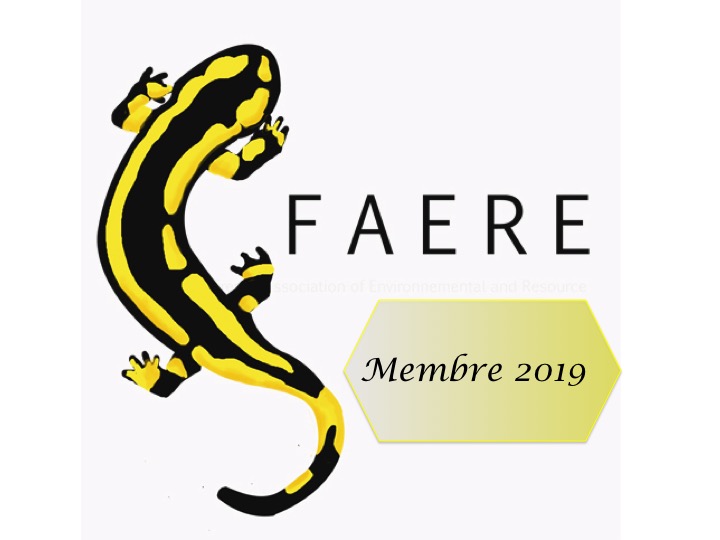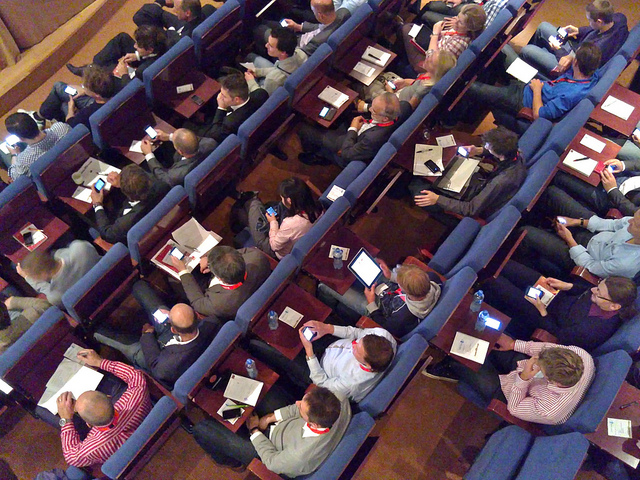|
 French Association of Environmental and Resource Economists French Association of Environmental and Resource Economists
Newsletter – January 2019
Hello everyone!
All our best wishes for a happy new year 2019! In particular, let us hope that our work will be as successful as it deserves and that this year will finally allow progress to be made throughout the world in the implementation of ambitious environmental protection policies.
In 2018 we celebrated the fifth anniversary of FAERE: after the World Conference in Gothenburg, which was attended by many members of the association, the Annual Conference gave us the opportunity to meet again this year in Aix-en-Provence and to welcome more and more colleagues from countries other than France. The year 2019 will be the year of the renewal of the association’s executive committee and bureau, which will take office at the end of the next annual conference, in Rennes on 29 and 30 August. All members who have paid their dues will be able to participate in electronic voting until August 27.
FAERE’s mission is to contribute to the dissemination of research results in the economics of the environment and natural resources. This is the purpose of its Working Papers and Policy Papers series, which provide increased visibility for work from various research centres and universities, large and small. The 2018 inventory shows the success of our authors in international journals.
We hope that the news gathered in this Newsletter will encourage you to visit our website regularly, submit your work to our Working Papers and Policy Papers series, organize or participate in events!

Elections
Half of the Steering Committee will be renewed this year following elections, the results of which will be announced at the General Assembly of Members to be held during the next annual conference, on 29-30 August in Rennes:
- outgoing members of the steering committee: Alain Ayong le Kama, Charles Figuières, Jean-Charles Hourcade, Harold Levrel, Fabien Prieur, François Salanié, Katheline Schubert.
- members remaining in place: Dominique Bureau, Mireille Chiroleu-Assouline, Julien Daubanes, Matthieu Glachant, Vincent Martinet, Aude Pommeret, Lionel Ragot.
This is a list vote and the vote will be conducted electronically. The lists of 7 names must be submitted to the Secretary General, Aude Pommeret (general-sec(at)faere.fr) by 1 June 2019.
In accordance with the association’s statutes, the new board will be elected by the members of the new executive committee.
Members who have paid their dues will be able to vote until August 27.

Annual and three-year membership
You can now join for the year 2019, either individually or as an institutional member for your research unit or organization. We remind you that, since last year, it is possible to contribute for a three-year membership at a more advantageous rate:
- three-years individual membership for civil years 2019-2021: 140€ instead of 150€
- three-years institutional membership for civil years 2019-2021: 2800€ instead of 3000€
Join us!

From one annual conference to another, including the FAERE Thematic Workshops
The 5th Annual FAERE Conference, organized by Charles Figuières and Hubert Stahn for the AMSE, took place in Aix-en-Provence on 30 and 31 August 2018. It welcomed more than 110 participants, including Anastasios Xepapadeas and Christian Gollier who had accepted to give the two plenary conferences. One of the key events of this conference was the organization by Alain Quinet of a round table around the work of the commission he chairs on the necessary updating of the carbon tutelary value. We would like to thank in particular the local organisation team for having succeeded in reconciling friendliness and scientific interest in a dense and exciting programme, in a very pleasant setting under the sun of Provence.
And last November, it was the University of French Guiana that hosted the 10th Thematic Workshop, on the themes “Biodiversity – Energy – Ecological transition”. A very interesting workshop that allowed colleagues from metropolitan France and the neighbouring French West Indies to exchange views with those from French Guiana, as well as with economic and political actors from the local authority. The hot topics of French Guiana’s gold and oil resource development, biodiversity conservation and economic development were at the centre of discussions. The event was superbly organized by the local team and the Rectorate of French Guiana, to whom we extend our warmest thanks.
Finally, the 6th Annual Conference of FAERE will take place in Rennes, on 29-30 August. It will be organized by Marie-Hélène Huber (CREM), Julie Ing (CREM) and Elodie Letort (SMART-LERECO). A call for papers will be issued by the end of the first quarter of 2019.

Election of a new honorary member of FAERE
The FAERE General Assembly meeting in Aix-en-Provence, during the 5th Annual Conference, elected a new honorary member in the person of Robert Cairns, professor in the Department of Economics at McGill University. His research focuses on the economics of natural resources, in particular the economics of non-renewable resources and industrial organization. The main topics of his current work are the economic theory of sustainability and the economics of capital and accounting, including green accounting.
Robert Cairns has maintained close ties with France for many years. He regularly welcomes many FAERE members to Montreal, some of whom are pleased to be among his co-authors.
  
Young Economist best paper FAERE Award
Since 2016, FAERE has awarded each year, at the annual conference, a award for the best article by young economists.
For the 2018 edition, the jury awarded two joint winners:
Both articles are published in our Working Papers series.

Ecological taxation in the foreground of French news at the end of 2018
The increase in fuel prices has given rise in France to large-scale protests and a questioning of the planned trajectory for ecological taxation. This was an opportunity for many economists to take a position on the subject in the press, mainly for educational purposes. You will find on the FAERE website links to the op-ed published by members of the association. Do not hesitate to let us know which ones are not listed in this section.

Working Papers and Policy Papers FAERE : success and new releases
Many Policy and Working Papers FAERE online on our website appeared in 2018 in international journals. Congratulations to the authors! And thank you to those who have pointed it out to us, allowing us to indicate it on the website. This year we received the following publications:
WP 2014.13
Prudence Dato
Inducing Sorting Investment and Implementation of an Alternative e-Waste Market under Imperfect Information.
Published in Economics Bulletin (2018), 38(1), 629-637.
WP 2015.02
Edmond Baranès – Julien Jacqmin – Jean-Christophe Poudou
Non-renewable and Intermittent Renewable Energy Sources: Friends and Foes?
Published in Energy Policy (2017), 111, 58-67.
WP 2015.03
Jean De Beir – Céline Emond – Yannick L’Horty – Laetitia Tuffery
Protecting Biodiversity by Developing Bio-Jobs: a Multi-branch Analysis with an Application on French Data.
Published in International Journal of Sustainable Development (2017), 20(3-4), 306-323.
WP 2015.15
Céline Guivarch – Antonin Pottier
Climate damages on production or on growth: what impact on the social cost of carbon.
Published in Environmental Modeling & Assessment (2018), 23(2), 117-130.
WP 2016.08
Basak Bayramoglu – Brian R. Copeland – Jean-François Jacques
Trade and fisheries subsidies.
Published in Journal of International Economics (2018), 112, 13-32.
WP 2016.16
Natalia Zugravu-Soilita
Trade in environmental goods and sustainable development: What are we learning from the transition economies’ experience?
Published in Environmental Economics and Policy Studies (2018), 20(4), 785-827.
WP 2016.17
Basak Bayramoglu – Michael Finus – Jean-François Jacques
Climate agreements in a mitigation-adaptation game.
Published in Journal of Public Economics (2018), 165, 101-113.
WP 2016.21
Marc Germain
Un modèle de décroissance optimale.
Published in Ecological Economics (2017), 136, 266-281.
WP 2016.24
Harold Levrel – Antoine Missemer
L’économicisation de la nature, réalités historiques et mythes contemporains.
Published in Revue économique (2018), 120-146.
WP 2016.29
Olivier Massol – Omer Rifaat
Phasing out the U.S. Federal Helium Reserve: Policy insights from a world helium model.
Published in Resource and Energy Economics (2018), 54, 186-211.
WP 2017.02
Stefano Bosi – David Desmarchelier
Natural cycles and pollution.
Published in Mathematical Social Sciences (2018), 96, 10-20.
WP 2017.05
Prudence Dato
Investment in Energy Efficiency, Adoption of Renewable Energy and Household Behaviour: Evidence from OECD countries.
Published in The Energy Journal (2018), 39(3), 213-245.
WP 2017.08 and PP 2017.02
Stefanija Veljanoska
Can Land Fragmentation Reduce the Exposure of Rural Households to Weather Variability?
Published in Ecological Economics (2018), 154, 42-51.
WP 2017.10
Marc Léandri – Mabel Tidball
Assessing the sustainability of optimal pollution paths in a world with inertia.
Published in Environmental Modeling and Assessment (2018), https://doi.org/10.1007/s10666-018-9612-8.
WP 2017.13 and PP 2017.03
Florian Fizaine – Pierre Voye – Catherine Baumont
Does the literature support a high willingness to pay for green label buildings? An answer with treatment of publication bias.
Published in Revue d’économie politique (2018), 128(5), 1013-1046.
WP 2017.16
Stefano Bosi – David Desmarchelier
A simple method to study local bifurcations of three and four-dimensional systems : characterizations and economic applications.
Published in Mathematical Social Sciences (2019), 97, 38-50.
WP 2017.24
Derya Keles – Johanna Choumert – Pascale Combes Motel – Eric Kere
Does the Expansion of Biofuels Encroach on the Forest?
Published in Journal of Forest Economics (2018), 33, 75-82.
WP 2017.28
Johanna Choumert – Pascale Combes Motel – Leonard Le Roux
Stacking up the Ladder: A Panel Data Analysis of Tanzanian Household Energy Choices.
Published in World Development (2018), 115, 222-235.
WP 2017.31 and PP 2017.09
Simon Quemin – Christian de Perthuis
Transitional Restricted Linkage between Emissions Trading Schemes.
Forthcoming in Environmental and Resource Economics (2018).
WP 2018.05
Salomé Bakaloglou – Dorothée Charlier
Energy Consumption in the French Residential Sector: How Much do Individual Preferences Matter?
Forthcoming in The Energy Journal (2019).
WP 2018.09
Julien Daubanes – Pierre Lasserre
The supply of non-renewable resources.
Forthcoming in Canadian Journal of Economics (2019).
WP 2018.11 and PP 2018.06
Dorothée Charlier – Sondès Kahouli
From residential energy demand to fuel poverty: income-induced non-linearities in the reactions of households to energy price fluctuations.
Forthcoming in The Energy Journal (2019).
WP 2018.12 and PP 2018.07
Onno Kuik – Frédéric Branger – Philippe Quirion
Competitive Advantage in the Renewable Energy Industry: Evidence from a Gravity Model.
Published in Renewable energy (2018), 131, 472-481.
WP 2018.13
Quentin Perrier – Philippe Quirion
How shifting investment towards low-carbon sectors impacts employment: three determinants under scrutiny.
Published in Energy Economics (2018), 75, 464-483.
WP 2018.18
Julien Daubanes – Pierre Lasserre
Marchés internationaux de droits à polluer et taxes locales sur les biens polluants.
Forthcoming in L’Actualité économique – Revue d’analyse économique (2019).
PP 2016.06
Dorothée Charlier – Bérangère Legendre
Fuel Poverty: a Composite Index Approach.
Forthcoming in The Energy Journal.
PP 2017.01
Quentin Perrier
French nuclear bet.
Published in Energy Economics (2018), 74, 858-877.
PP 2017.08
Audrey Berry
Compensating households from carbon tax regressivity and fuel poverty : a microsimulation study.
Published in Energy Policy (2018), 124, 81-94.
PP 2018.01
Florian Fizaine – Sondès Kahouli
On the power of indicators: how the choice of the fuel poverty measure affects the identification of the target population.
Forthcoming in Applied Economics.

Working Papers and Policy Papers FAERE : latest releases
Since the last Newsletter, we have had 19 new publications in the Working Papers series and 7 in the Public Policy Series, thanks to the involvement of the Editorial Board members. All researchers interested in rapidly disseminating their research work, prior to publication in a journal, are invited to submit in these series. You do not need to be a member of FAERE to access it.
Working Papers :
WP 2018.03
Laura Recuero Virto – Denis Couvet – Frédéric Ducarme
The determinants of economic growth in countries with high marine biodiversity: Effects of potential anthropogenic pressures on the marine environment
WP 2018.04
Amandine Gnonlonfin – Yusuf Kocoglu
Tarification incitative et gestion des déchets ménagers : études du comportement des collectivités locales françaises
WP 2018.05
Salomé Bakaloglou – Dorothée Charlier
Energy Consumption in the French Residential Sector: How Much do Individual Preferences Matter?
WP 2018.06
Laura Recuero Virto – Denis Couvet
Economic growth determinants in countries with blue carbon: Natural capital as a limiting factor?
WP 2018.07
Louis-Gaëtan Giraudet
Energy efficiency as a credence good : A review of informational barriers to building energy savings
WP 2018.08
Camille Régnier
Open space preservation in an urbanization context
WP 2018.10
Thomas Douenne
The vertical and horizontal distributive effects of energy taxes: A case study of a French policy.
WP 2018.11
Dorothée Charlier – Sondès Kahouli
From residential energy demand to fuel poverty: income-induced non-linearities in the reactions of households to energy price fluctuations.
WP 2018.12
Onno Kuik – Frédéric Branger – Philippe Quirion
Competitive Advantage in the Renewable Energy Industry: Evidence from a Gravity Model.
WP 2018.13
Quentin Perrier – Philippe Quirion
How shifting investment towards low-carbon sectors impacts employment: three determinants under scrutiny.
WP 2018.14
Gilles Lafforgue – Luc Rouge
A dynamic model of recycling with endogenous technological breakthrough.
WP 2018.15
Salomé Bakaloglou – Dorothée Charlier
The Role of Individual Preferences in Explaining the Energy Performance Gap.
WP 2018.16
Geoffrey Barrows – Hélène Ollivier
Foreign Demand and Greenhouse Gas Emissions: Empirical Evidence with Implications for Leakage.
WP 2018.17
Dina Kassab
Tax Exemptions of Ethical Products Revisited.
WP 2018.18
Julien Daubanes – Pierre Lasserre
Marchés internationaux de droits à polluer et taxes locales sur les biens polluants.
WP 2018.19
Simon Quemin – Raphaël Trotignon
Intertemporal Emissions Trading and Market Design : an Application to the EU-ETS.
WP 2018.20
Kenichi Mizobuchi – Hiroaki Yamagami
Time Rebound Effect in Households’ Energy Use: Theory and Evidence.
Policy Papers :
PP 2018.03
Laura Recuero Virto
A preliminary assessment of the indicators for Sustainable Development Goal (SDG) 14 “Conserve and sustainably use the oceans, seas and marine resources”
PP 2018.04
Louis-Gaëtan Giraudet
Energy efficiency as a credence good: A review of informational barriers to building energy savings
PP 2018.05
Thomas Douenne
The vertical and horizontal distributive effects of energy taxes
PP 2018.06
Dorothée Charlier – Sondès Kahouli
From residential energy demand to fuel poverty : income-induced non-linearities in the reactions of households to energy price fluctuations.
PP 2018.07
Onno Kuik – Frédéric Branger – Philippe Quirion
Competitive Advantage in the Renewable Energy Industry: Evidence from a Gravity Model.
PP 2018.08
Salomé Bakaloglou – Dorothée Charlier
The Role of Individual Preferences in Explaining the Energy Performance Gap.
PP 2018.09
Adrien Fabre
Evolution of EROIs of Electricity Until 2050: estimation Using the Input-Output Model THEMIS.
All the best!
|
![]()











